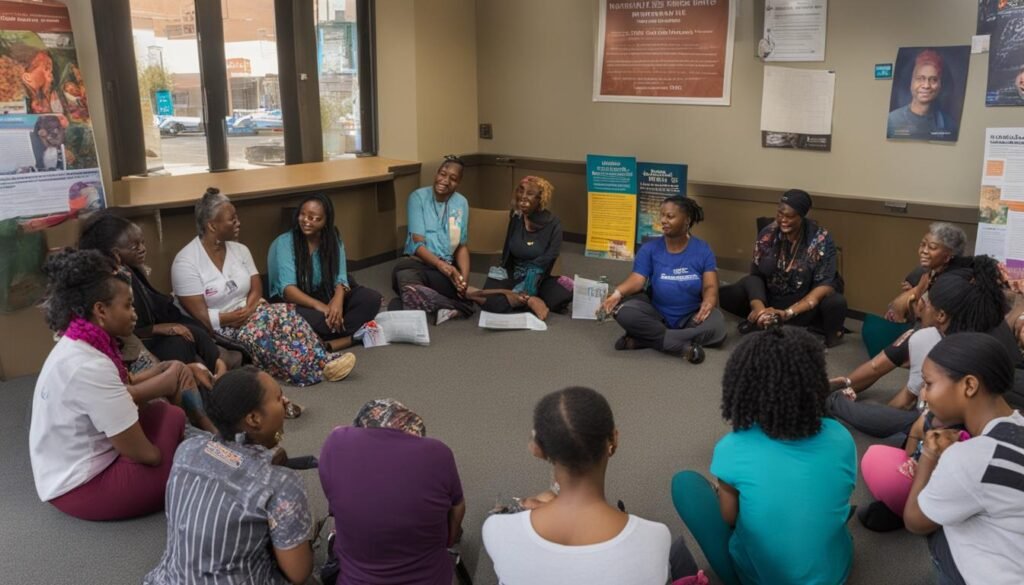Why is Black Mental Health Important?
In recent years, there has been growing recognition of the importance of mental health in the Black community. However, there remains a significant disparity in the access and quality of mental health care for Black individuals. Understanding why Black mental health matters is crucial for promoting well-being and advocating for equal treatment.
Historically, Black Americans have faced unique challenges and experiences that have contributed to higher rates of mental health conditions. Cultural factors, such as stigma surrounding mental health, have led to a reluctance to seek professional help. Systematic barriers, including economic insecurity and exposure to trauma, further compound the issue. It is essential to address these disparities and promote the mental well-being of Black individuals.
Key Takeaways:
- Black mental health is essential for overall well-being and should be prioritized.
- Historical and cultural factors contribute to mental health disparities in the Black community.
- Stigma and systemic barriers make accessing quality mental health care more difficult for Black individuals.
- Addressing these disparities requires promoting cultural awareness and advocating for equal care.
- Improving mental health outcomes for Black Americans benefits society as a whole.
Understanding the Stigma and Barriers
The Black community faces significant stigma when it comes to mental health, perpetuating barriers to care and hindering access to appropriate treatment. Historical misconceptions and cultural beliefs have contributed to the underestimation of the effects and impact of mental health conditions in this community, often reinforcing the idea that seeking help is a sign of personal weakness.
This stigma affects Black Americans’ willingness to acknowledge and address their mental health concerns, resulting in lower rates of help-seeking behaviors compared to their white counterparts. According to research, only 25% of Black individuals seek mental health treatment when needed, compared to 40% of white individuals.
One of the key barriers to care is the lack of cultural sensitivity within the healthcare system. Often, mental health professionals may not fully understand or address the specific cultural needs and experiences of Black patients. This lack of cultural competence can lead to misdiagnosis, ineffective treatment, and a breakdown in therapeutic rapport.
Instead of relying on professional medical care, the Black community often leans on their family and community support networks as a primary means of dealing with mental health concerns. While these networks can provide valuable emotional support, they may not always be equipped to handle the complexities of mental health conditions and may not have the necessary resources or expertise to provide evidence-based interventions.
“Historical misconceptions and cultural beliefs have led to the underestimation of the effects and impact of mental health conditions in the Black community, reinforcing the idea that seeking help is a sign of personal weakness.”
The Importance of Culturally Sensitive Care
To overcome the stigma and barriers surrounding mental health in the Black community, it is essential to provide culturally sensitive care that acknowledges and respects the unique experiences and needs of Black individuals.
Culturally sensitive care takes into account the history, culture, and lived experiences of Black Americans, ensuring that mental health professionals are equipped with the knowledge and skills to provide effective interventions. This includes understanding racial identity development, the impact of racism and discrimination on mental health, and the importance of intersectionality in addressing the complexities of multiple identities.
By providing culturally sensitive care, mental health professionals can foster trust, enhance treatment outcomes, and dismantle stigma. It is crucial for patients to feel seen, heard, and understood in the therapy room in order to create a safe and supportive environment for their healing journey.

“Culturally sensitive care takes into account the history, culture, and lived experiences of Black Americans, ensuring that mental health professionals are equipped with the knowledge and skills to provide effective interventions.”
Moreover, culturally sensitive care also involves recognizing and addressing the impact of systemic racism on mental health. This includes acknowledging and validating racial trauma, supporting individuals in processing intergenerational trauma, and advocating for social justice initiatives that seek to dismantle systemic barriers and promote mental well-being among Black Americans.
By prioritizing culturally sensitive care, mental health professionals and the healthcare system as a whole can play a vital role in reducing disparities, improving access to care, and supporting the mental health journeys of Black individuals.
The Impact of Racial Discrimination
Racism has a profound impact on the mental health and well-being of Black Americans. Historical experiences of slavery, oppression, and discrimination have resulted in the development of racial trauma, which can be both direct and intergenerational. Direct experiences of racism, such as experiencing racial slurs or acts of violence, can have immediate and long-lasting effects on an individual’s mental health. Witnessing and internalizing systemic racism, including disparities in employment, education, and healthcare, also contribute to higher rates of mental health conditions among Black individuals.
“It is impossible to talk about the impact of racism on mental health without acknowledging the deep-rooted trauma that it causes. Racism attacks not only our physical bodies but also our minds and spirits. It is an ongoing source of stress and anxiety, impacting every aspect of our lives.” – Dr. Joy DeGruy
Black individuals who have experienced racism may be more susceptible to developing mental health disorders such as depression, anxiety, and post-traumatic stress disorder (PTSD). According to a study published in the Journal of Traumatic Stress, racial discrimination is associated with higher levels of PTSD symptoms among Black adults.
Furthermore, intergenerational trauma plays a significant role in shaping the mental health outcomes of Black individuals. Traumatic experiences and their associated emotional and psychological impacts can be passed down from one generation to the next. This intergenerational trauma further exacerbates mental health disparities within the Black community.
Impact of Racism on Mental Health
The impact of racism on mental health is multifaceted and can manifest in different ways. Some common psychological reactions to racial trauma include:
- Depression: Racial discrimination and the associated stress and feelings of marginalization can contribute to the development of depressive symptoms.
- Anxiety: Experiencing racism can lead to increased levels of anxiety, including generalized anxiety disorder and social anxiety disorder.
- Anger and hostility: Racism can evoke feelings of anger, resentment, and hostility towards both the perpetrators of racism and society as a whole.
- PTSD: The ongoing exposure to racism and racial trauma can result in post-traumatic stress disorder, characterized by intrusive thoughts, flashbacks, and hypervigilance.
- Low self-esteem: Constant exposure to racism can erode an individual’s self-esteem and self-worth, leading to feelings of inferiority.
Breaking the Cycle of Racial Trauma
Addressing the impact of racism on mental health requires comprehensive efforts to combat racial discrimination, promote healing, and build resilience within the Black community. This includes:
- Providing access to culturally competent mental health care services
- Advocating for policy changes that address systemic racism and promote equality
- Supporting community-based organizations that offer resources and support for individuals impacted by racial trauma
- Strengthening social support networks to foster resilience and healing
- Educating individuals and communities about the impact of racism on mental health and the importance of self-care
| Impact of Racism on Mental Health | Strategies for Healing and Resilience |
|---|---|
|
|
The Stigma Associated with Mental Health Concerns
In the Black community, there is a significant stigma surrounding mental health concerns, which often leads to a reluctance to acknowledge psychological difficulties. This stigma is deeply rooted in historical and cultural factors that have perpetuated the idea that mental health issues are a sign of weakness or personal failure.
Instead of seeking professional help, many individuals in the Black community rely on coping mechanisms such as religious guidance and prayer. While these coping mechanisms can provide some form of support, they are often insufficient in addressing the underlying mental health conditions that require specialized treatment.
It is crucial to destigmatize mental health in the Black community and encourage help-seeking behavior. Raising awareness about the importance of mental health, promoting education on different mental health conditions, and highlighting the available resources and support options are vital steps in overcoming the barriers associated with seeking professional help.
“The stigma surrounding mental health in the Black community is a significant hindrance to individuals receiving the care they need. It is essential for us to break down these barriers and create a safe space for dialogue, understanding, and healing.”
By addressing the stigma surrounding Black mental health, individuals in the community can feel more comfortable reaching out for professional help and accessing the appropriate resources for their mental well-being. Recognizing that mental health is an essential part of overall well-being and promoting a culture of acceptance and compassion will contribute to a healthier and more resilient Black community.

| Coping Mechanisms in the Black Community | Benefits |
|---|---|
| Religious guidance and prayer | Offers spiritual support and comfort |
| Community and familial support | Provides a sense of belonging and understanding |
| Social connections | Allows for emotional support and shared experiences |
Systematic Barriers to Black Mental Health
The Black community faces numerous systematic barriers that contribute to mental health disparities. These barriers encompass economic insecurity, exposure to trauma, and lack of access to care.
Economic Insecurity
Economic disparities play a significant role in mental health disparities within the Black community. Higher rates of poverty and limited access to resources perpetuate the cycle of economic insecurity, increasing the likelihood of developing mental health issues. Economic instability can lead to chronic stress, anxiety, and depression, further exacerbating the mental health disparities.
Exposure to Trauma
Black individuals are disproportionately exposed to trauma, which significantly impacts mental health outcomes. Systemic racism, police violence, and community violence contribute to higher rates of post-traumatic stress disorder (PTSD) and other trauma-related conditions. The cumulative effect of these traumatic experiences further widens the mental health disparities among Black Americans.
Lack of Access to Care
One of the key contributors to mental health disparities in the Black community is the lack of access to quality and culturally responsive mental healthcare. Limited availability of insurance coverage, financial constraints, and a shortage of mental health providers who understand the unique cultural experiences of Black individuals ultimately hinder access to necessary care. Additionally, historical mistrust in the medical system caused by past abuses and discrimination can further discourage seeking mental health support.
It is crucial to address these systematic barriers comprehensively to reduce mental health disparities in the Black community. Efforts must be made to create equitable economic opportunities, provide trauma-informed care, and improve access to culturally sensitive mental health services. By addressing these barriers, we can take significant steps toward achieving mental health equity for all.
| Systematic Barriers | Impact on Mental Health Disparities |
|---|---|
| Economic Insecurity | Prolonged stress, anxiety, and depression |
| Exposure to Trauma | Higher rates of PTSD and trauma-related conditions |
| Lack of Access to Care | Limited utilization of mental health services |
Culturally Responsive Mental Health Treatment
Culturally responsive mental health treatment plays a crucial role in addressing the disparities in psychological well-being within the Black community. Recognizing and understanding the significance of cultural awareness in mental health is essential for mental health providers. By embracing cultural diversity, mental health professionals can ensure that their care is tailored to the unique needs and experiences of Black individuals.
When seeking mental health support, clients should actively seek out providers who are culturally sensitive and respectful. It is important to find professionals who understand and value the cultural backgrounds, beliefs, and experiences of their clients. By doing so, individuals can greatly enhance the effectiveness of their treatment and promote a greater sense of trust and connection with their provider.
Efforts towards social justice and equality should also include access to culturally sensitive and appropriate mental health care for the Black community. By addressing the unique challenges and experiences faced by Black individuals, culturally responsive care can help bridge the gap in mental health disparities.
One example of culturally responsive care is incorporating elements of Afrocentric psychotherapy, which draws on African cultural values, traditions, and spirituality to support healing and well-being. This approach acknowledges the strengths and resilience of the Black community and serves as a powerful tool for promoting mental health.
“Culturally responsive mental health treatment recognizes and respects the cultural diversity within the Black community, promoting inclusivity, understanding, and effective care.”
By integrating culturally responsive approaches into mental health care, providers can create an environment that fosters trust, understanding, and healing. This not only addresses the specific needs of the Black community but also contributes to a more equitable and inclusive mental health system.
Promoting Cultural Responsiveness in Mental Health Care
To ensure culturally responsive mental health care, it is important for mental health professionals to:
- Receive training and education on cultural competency and awareness
- Recognize and challenge their own biases and assumptions
- Engage in ongoing learning and professional development
- Build strong relationships with community organizations and leaders
- Seek feedback and input from clients to continually improve their services
By actively promoting cultural responsiveness, mental health providers can make significant strides in reducing mental health disparities and improving outcomes for Black individuals.
The Need for Equal Mental Health Care
To address the mental health disparities in the Black community, advocating for equal care is paramount. It is crucial to reduce barriers to care, improve access to treatment, and promote equitable mental health services for Black individuals. By doing so, we can work towards reducing mental health disparities and improving overall well-being.
The Importance of Reducing Barriers to Care
Reducing barriers to care is a crucial step towards achieving equal mental health care for the Black community. These barriers can include financial limitations, lack of insurance coverage, and limited availability of culturally sensitive mental health providers. By addressing these barriers, we can ensure that Black individuals have the same level of access to mental health services as other populations.
Increasing the Number of Black Mental Health Providers
Improving access to treatment also involves increasing the representation of Black mental health providers in the field. Having more Black mental health professionals can help in providing culturally responsive care, as they are better equipped to understand the unique experiences and needs of Black individuals. This representation can also help reduce the stigma surrounding mental health in the community.
Improving Cultural Sensitivity in the Healthcare System
Improving cultural sensitivity in the healthcare system is essential to ensure that mental health services are accessible and effective for Black individuals. This includes training healthcare professionals on the unique challenges faced by the Black community and providing resources to enhance their cultural competence. By creating a more inclusive and understanding healthcare environment, we can better address the mental health needs of Black individuals.
The Role of Advocacy in Equal Mental Health Care
Advocacy plays a vital role in promoting equal mental health care for Black individuals. It involves raising awareness about mental health disparities, influencing policy changes that prioritize equitable care, and challenging the systemic barriers that contribute to these disparities. Through advocacy, we can drive meaningful change and ensure that Black individuals receive the quality mental health care they deserve.
| Benefits of Equal Mental Health Care for Black Individuals | Actions to Advocate for Equal Mental Health Care |
|---|---|
|
|
Advocating for equal mental health care for Black individuals is a crucial step towards reducing mental health disparities and improving overall well-being. By reducing barriers to care, increasing representation in the mental health field, improving cultural sensitivity, and advocating for policy changes, we can work towards a more equitable mental health system that better serves the needs of the Black community.
Conclusion
The significance of Black mental health cannot be overstated. Historical and cultural factors, along with systematic barriers, have contributed to mental health disparities within the Black community. To improve the mental well-being of Black individuals, it is crucial to address stigma, promote culturally responsive care, and advocate for equal access to treatment. Prioritizing Black mental health is not only necessary for the individuals in need but also for creating a more equitable and inclusive society.
By addressing the stigma surrounding mental health concerns in the Black community and promoting education and awareness, we can encourage help-seeking behavior and destigmatize psychological difficulties. Additionally, providing culturally responsive mental health treatment is essential to address the unique needs and experiences of Black individuals.
To reduce mental health disparities, it is imperative to ensure equal access to mental health care. This involves reducing systematic barriers, such as poverty and lack of insurance, and increasing the availability of culturally sensitive mental health providers. Advocacy for equal mental health care for Black individuals is crucial in achieving a more equitable and just mental health system.
FAQ
Why is Black mental health important?
Black mental health is important because it directly impacts the overall well-being and quality of life of Black individuals. Addressing mental health disparities, promoting equitable care, and destigmatizing mental health in the Black community are essential steps towards creating a more inclusive and healthy society.
How does stigma affect Black Americans?
Stigma surrounding mental health concerns in the Black community often leads to a reluctance to acknowledge psychological difficulties. This results in a lower rate of help-seeking behavior and can prevent access to necessary treatment and support.
What are the barriers to care for Black Americans?
Barriers to care for Black Americans include a lack of cultural sensitivity by healthcare professionals, historical mistrust in the medical system, and reliance on family and community support instead of medical treatment. Finding culturally sensitive care is crucial in addressing these disparities.
How does racism impact the mental health of Black Americans?
Racism is a significant threat to the mental health and well-being of Black Americans. Historical experiences of slavery, oppression, and discrimination have led to the development of racial trauma, both direct and intergenerational. Direct experiences of racism, as well as witnessing and internalizing systemic racism, contribute to higher rates of mental health conditions and post-traumatic stress disorder (PTSD) among Black individuals.
What coping mechanisms are commonly preferred in the Black community?
In the Black community, coping mechanisms such as religious guidance and prayer are commonly preferred over seeking professional help. This can be attributed to the stigma surrounding mental health concerns and a reliance on community support systems.
What are the systematic barriers to Black mental health?
Black individuals face systematic barriers such as higher rates of poverty, homelessness, incarceration, and exposure to violence, which contribute to increased risk of developing mental health issues. Lack of access to adequate insurance and culturally responsive mental health providers, as well as historical mistrust in the medical system, further exacerbate these disparities.
Why is culturally responsive mental health treatment important?
Culturally responsive mental health treatment is crucial in addressing the disparities in psychological well-being in the Black community. Recognizing and understanding the role of culture in mental health is essential for mental health providers. Clients should seek out providers who are culturally responsive and respectful of their needs.
Why is equal mental health care necessary?
Equal access to mental health care is necessary to address the mental health disparities in the Black community. This involves reducing barriers to care, increasing the number of Black mental health providers, improving cultural sensitivity in the healthcare system, and addressing insurance and financial burdens.






